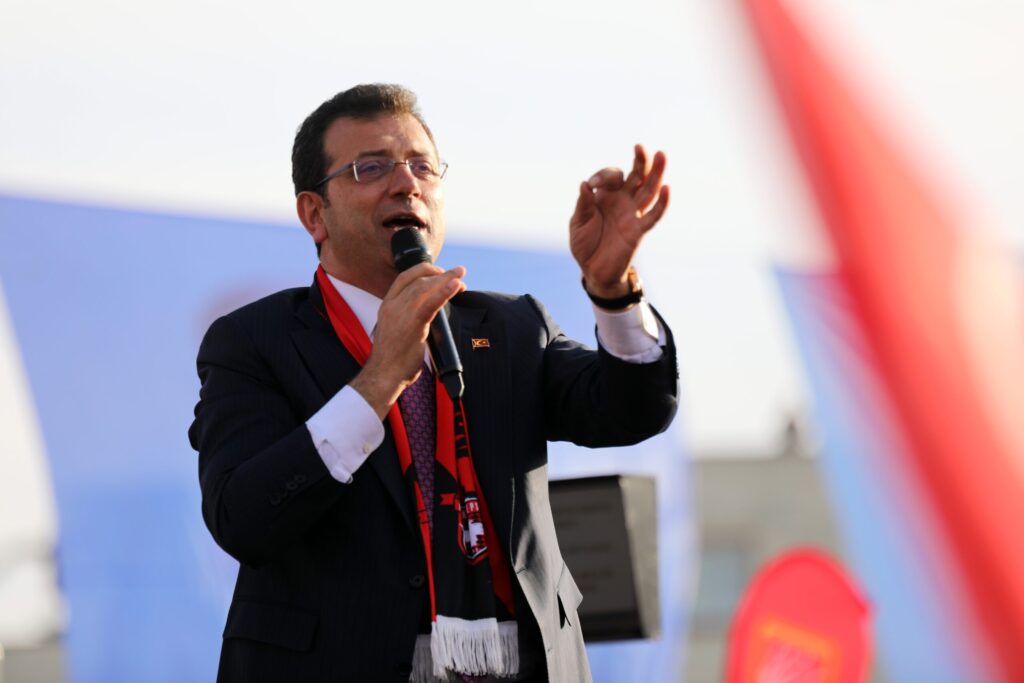
Wikimedia Commons/Orhan Erkılıç
The detention of Istanbul’s mayor Ekrem İmamoğlu on March 18 has sent shockwaves through Turkey’s financial markets.
Stock indices in the country’s economic hub plunged and the Capital Markets Board of Turkey moved quickly to implement emergency measures aimed at calming volatility.
The impact of the political turmoil is becoming clearer. Data from the Central Bank of the Republic of Turkey (CBRT) showed foreign investors withdrew $7 billion from the Turkish stock market and more from the bond market between March 14 and 21.
In its attempts to shore up the Turkish lira, the CBRT deployed $28 billion from its foreign currency reserves between March 19 and 24. Since March 25 the foreign exchange market has shown some signs of stabilisation, alongside a modest recovery in the CBRT’s reserve position.
Turkey’s most pressing economic issue continues to be its cost-of-living crisis, fuelled by persistently high inflation. The country’s traditional middle class is steadily being eroded as high inflation eats away at savings and tightens disposable income.
Since the May 2023 presidential and parliamentary elections, when Recep Tayyip Erdoğan secured his eleventh term as president and a new finance minister took office, the country has grappled with soaring prices.
At the time of the transition, consumer inflation stood at 38 percent. Efforts to rein it in have since failed.
As of February, inflation was still at 39 percent. The Turkish Statistical Institute is due to announce figures for March shortly, with widespread expectations that put inflation at 38.5 percent, meaning no real downward trend.
The CBRT projects year-end inflation at 24 percent, a forecast many analysts view as overly optimistic. A drop from 39 percent to 24 percent in just nine months would imply sharp disinflation, which seems unlikely given current economic dynamics.
While a steep decline in inflation could occur if consumer spending and business activity slow dramatically, such a scenario could plunge the Turkish economy into a different set of challenges, including stagnation and rising unemployment.
The levels of price rises and attendant high interest rates are having effects in the real world. Waves of bankruptcies have hit the real sector (production and manufacturing), as businesses struggle with limited access to bank financing. Banks are currently not lending enough, threatening private sector cash flows.
Turkey’s manufacturing sector also struggled through 2024, but has shown signs of recovery in recent months. Still, persistent political and economic instability casts doubt on the sector’s ability to maintain momentum.
History repeating
Since June 2015 Turkey has experienced strong market fluctuations caused by repeated political crises. The ruling AKP party lost its parliamentary majority for the first time in 2015, leading to forced snap elections that November.
In 2019 the Istanbul mayoral election was cancelled and re-run, deepening political instability.
Given these precedents, political uncertainty is likely to persist – and intermittently escalate – in the run-up to presidential elections due in 2028.
Under these conditions, capital flight may well continue, placing additional strain on the Turkish lira and exerting downward pressure on the stock market.
What is the outlook? Understanding the difference between foreign direct investment (FDI) and portfolio investment is essential in assessing Turkey’s long-term economic prospects.
Dependence on volatile capital inflows exposes the country to long-term risks
While both developing and underdeveloped countries can attract short-term foreign capital, even under politically unstable regimes, this largely depends on the stability of their financial markets.
Turkey’s current economic programme has leaned heavily on attracting short-term portfolio investments – the so-called carry trade – supported by a tight monetary policy. However, this reliance comes at a cost.
Without a stronger focus on sustainable FDI or building economic self-reliance, dependence on volatile capital inflows exposes the country to long-term risks.
Turkey’s manufacturing industries depend heavily on raw material imports to produce and export goods. To that end, maintaining adequate foreign currency reserves is critical to Turkey’s ability to sustain trade and industrial production.
International economic relations become even more crucial during periods of domestic political crisis. Trade, foreign investment and financial partnerships can serve as buffers against economic shocks triggered by political instability.
However, internal political tensions often undermine these safeguards, eroding investor confidence, disrupting capital flows and destabilising financial markets at a time when resilience is most needed.
Turkey and the GCC kicked off free trade agreement negotiations in March 2024. However, progress on the details has been slow.
Despite a lack of momentum on trade, economic ties remain strong. Gulf states account for roughly 9 percent of total direct investment in Turkey, with capital flowing into major sectors such as real estate, industry, finance and technology.
Ongoing fragility
Nevertheless, while Turkey’s economic policies continue to be shaped by short-term political priorities rather than long-term fundamentals, its economy will remain vulnerable, particularly if political unrest persists.
It remains to be seen whether Turkey can navigate its challenges or if prolonged instability will deepen its economic woes.
Beyond the financial risks, a deeper concern looms: the future of Turkey’s already fragile democratic institutions hangs in the balance.
Arda Tunca is an economist and financial adviser based in Bodrum, Turkey



